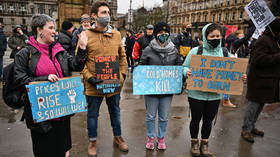UK energy bills seen soaring

UK consumers will soon be paying an average of more than £3,300 annually in household energy costs, a 71% increase from the record-high utility rates they’re currently incurring, as wholesale natural gas prices soar amid anti-Russia sanctions over the Ukraine crisis, a research firm has predicted.
The energy price cap set by regulator Ofgem will jump to £3,363 a year (just over $4,000) for the average household by January from the current level of £1,971, according to the latest projections by forecaster Cornwall Insight, released on Friday. The firm also raised its annualized cost projection for the October-December period to £3,244, up 12% from the third-quarter prediction that it made just two weeks ago.
If Cornwall’s new October estimate is correct, UK consumer energy costs will have jumped 154% in the past year when Ofgem announces its price cap for the next quarter. The utility costs are based largely on energy prices in wholesale markets, and Ofgem’s lowest pricing cap applies to about 22 million households with default tariffs that are directly debited from their bank accounts. Other households pay even higher rates.
Our price cap predictions for Jan 2023 have risen to £3,363 a year for an average consumer, increasing from the £3,003 figure released two weeks ago.Predictions for the Oct cap, have also seen a steep rise, and now sit at £3,244 a year.Read more here: https://t.co/NLZRofoeLVpic.twitter.com/8zhONZPkzA
— Cornwall Insight (@CornwallInsight) July 8, 2022
Even before the Russia-Ukraine conflict, UK consumers were seeing sharp hikes in energy costs. The price cap announced by Ofgem in early February, which went into effect in April, marked a 54% increase from the previous rate.
The earlier surge doubled the number of UK households in “fuel poverty” – meaning that more than 10% of their income is eaten up by energy bills – to 5 million, the Resolution Foundation estimated in April. Annual costs of £3,000 could leave 8.5 million households struggling to pay their heating and electricity bills, according to a group called the End Fuel Poverty Coalition.
“Energy consumers are facing the prospect of a very expensive winter,” said Craig Lowery, a principal consultant at Cornwall Insight. He added that along with uncertainties over Russian gas supplies, the recent strike by offshore Norwegian oil and gas workers caused prices to rise to “even more unaffordable levels.”
The overall UK inflation rate rose to a 40-year high in May, driven partly by rising food and petrol prices.













